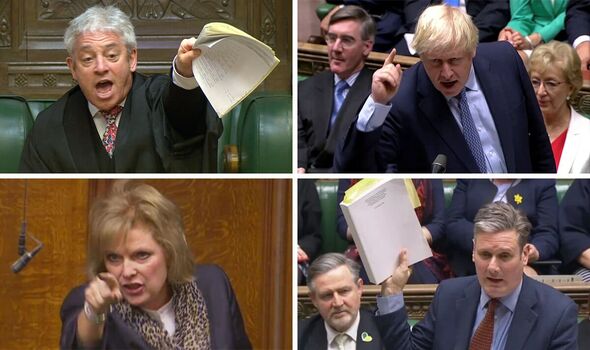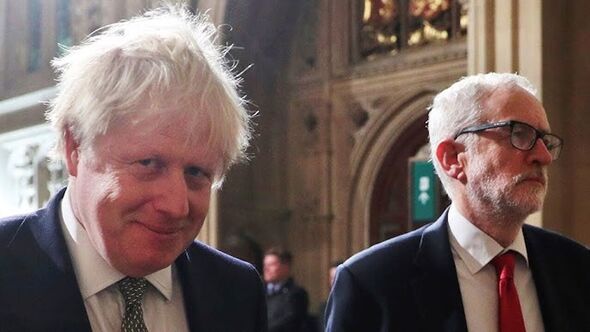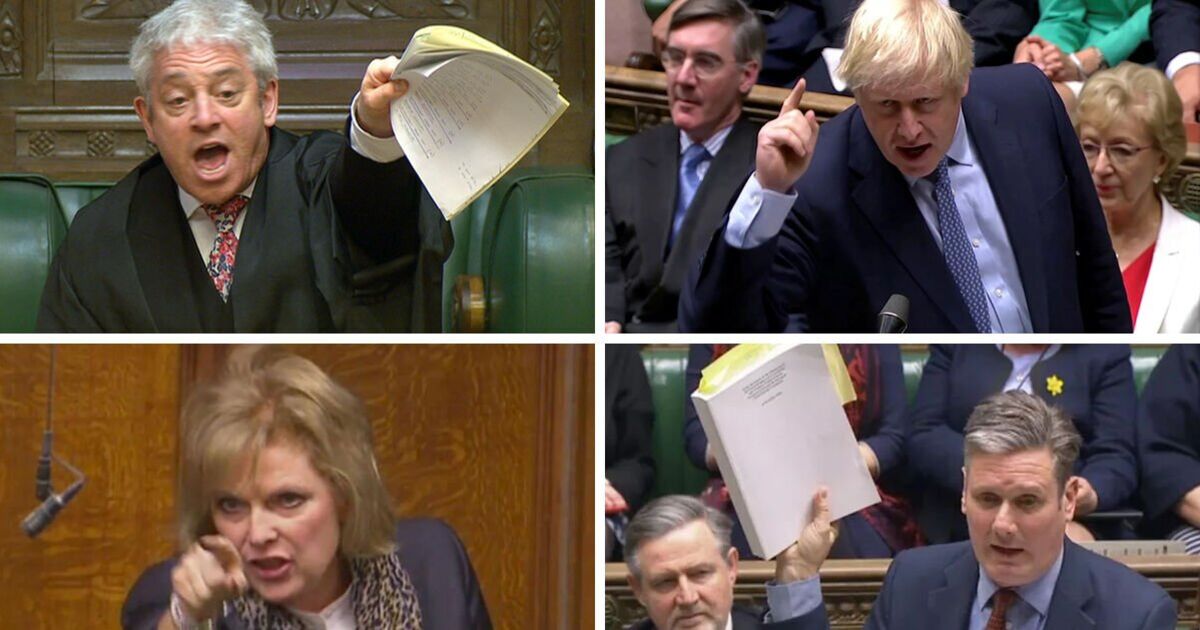
MPs lost their minds during the Brexit psychodrama (Image: House of Commons)
Twitter users have been recalling some of the most darkly funny moments from Britain’s real-life political soap opera ahead of a major Brexit anniversary.
Next week will mark six years since Boris Johnson requested that the Queen prorogue parliament in order to avoid MPs preventing a no-deal exit from Brussels, a moment that marked a fever pitch of anger sparked by the 2016 vote.
After years of parliamentary infighting, failing to agree a deal and attempted reversing of Brexit altogether, Mr Johnson finally ‘Got Brexit Done’ in the early days of 2020, after defeating Jeremy Corbyn and the Remainer cabal and securing a landslide majority.
In the years that have followed, Covid, scandals and Liz Truss have made Brexit feel like a distant memory, but thanks to X users, you can enjoy a trip down the memory lane of high political drama, farce and delusion.
Read more: Tory Brexiteers mock Corbyn’s U-turn – Commons erupt in laughter

Boris Johnson faced a sticky wicket, but came out trumps in the end (Image: House of Commons)
The indicative votes
In March 2019 MPs took control of the order paper to schedule a series of so-called ‘indicative votes’, which would allow MPs to have their say in the Commons on the sort of Brexit they wanted.
After weeks of demanding the votes, MPs were given eight different versions of Brexit to choose from, from leaving without a deal, staying in the customs union, Labour’s proposals, and reversing Brexit altogether.
After hours of debate and voting, MPs finally learnt that not a single one of the eight proposals had received the support of a majority of their number, as every single member refused to compromise from their own preferred option.
The results marked one of the most farcical moments of the whole three-year saga, and helped prove that MPs were letting down the country.
In the row following the votes, hardcore Remainer Anna Soubry rose to speak, telling MPs: “Let’s try to remind ourselves what we’ve decided to do”, prompting hilarious heckles of: “Nothing!”
Tory MPs losing it
In July 2018 Theresa May’s loose grip on power was becoming completely unstuck, as Tory MPs descended into a rabble of squabbling, swearing and backstabbing.
She was forced to call on her MPs to stick with the plan and back her Brexit deal, while criticism and open rebellion rained down on No. 10.
Backbencher Henry Smith snubbed an invitation by the Chief Whip to watch an England match at Downing Street, saying that because the PM “isn’t bringing Brexit home I’m concerned attending would be a bad omen for football coming home”.
Chris Green, a PPS in the government, quit as he demanded “Brexit must mean Brexit”, prompting fellow Tory MP Simon Hart – who would go on to be Chief Whip under Rishi Sunak – to publicly reply: “Your a pps Chris. It is not relevant and nobody gives a f**k. Apart from me obviously.”
Fellow MP Simon Clarke piled in, calling his outburst “really poor form, Simon. Really poor.”
That same week two Tory vice chairs quit, with the PM’s spokesman sardonically replying: “She thanks them for their service.”
If only Tory MPs had known things would never get any better…
Parliament’s first Saturday sitting since the Falklands
In October 2019 MPs were called back to Parliament for an emergency attempt to get Brexit done ahead of the then-October deadline.
It was a moment of high drama, not least because it was the first time MPs had debated on a Saturday since the Falklands war in 1982.
MPs rushed from their constituencies for Boris Johnson’s last-ditch attempts to pass a deal before the deadline
In the end, MPs voted to squander the historic moment and vote to do nothing.
The vote was hijacked by serious anti-Brexit Tory plotter Oliver Letwin, who passed an amendment withholding support for his Brexit deal and forced him to delay Brexit for weeks longer.
Boris Johnson told MPs he was not “daunted or dismayed” by the latest anti-Brexit move, and would press on regardless. He, of course, was right in the end.
Keir Starmer rejecting his own Brexit policy by accident
Keir Starmer likes to brandish his reputation as a man of detail, setting himself apart from the Boris/Corbyn approach to Brexit.
However this came undone when he took part in last-ditch efforts by Theresa May to save her premiership by inviting Labour into No10 for negotiations to improve her deal in the eyes of Labour MPs and get it through with their support.
According to Theresa May’s then-communications chief, Sir Keir was in No. 10 for the talks when he was presented with a potential document for him and the Labour Party to agree to.
After looking at it, Sir Keir described it as a “total disaster” of a proposal, only to be told they had been cut and pasted from his own Brexit policy document.
Theresa May’s comms chief quipped: “Disingenuous is his middle name, I think.”
Keir Starmer branded ‘disingenuous’ by Sir Robbie Gibb
Change UK
Anna Soubry was mentioned previously, a name that now has very little recognition but at the time was a key player in the endless Brexit drama.
Ms Soubry was among a number of MPs who quit their parties – both Tory and Labour – and eventually formed a new, centrist anti-Brexit party.
Initially it was called ‘The Independent Group’, and sparked terror in Westminster as it soared in the polls.
The group changed their name to Change UK, but tanked at the European Elections in 2019 and never came back.
With defections to the LIbDems, just five MPs stood under Ms Soubry’s Change UK banner at the election, and all five lost their seats.

The infamous Change UK Nandos meal (Image: @ChukaUmunna)
The ‘Government of national unity’
A moment that proved anti-Brexit MPs had fully lost it came when proposals emerged in August 2019 for a “government of national unity”, in other words, a government elected by no one explicitly designed to take control of Parliament and block Britain’s exit.
Remainers had concluded that merely forcing a vote of no confidence in Boris Johnson wouldn’t work, as that could lead to Jeremy Corbyn becoming PM, whom they did not trust.
Instead they began a search for an alternative PM-in-waiting, a centrist Remainer who could win support of moderate Labour, Tory, LibDem, SNP and Green MPs to block Brexit.
Multiple names were thrown around: Ken Clarke, Harriet Harman, Caroline Lucas, Yvette Cooper, and Dominic Grieve.
This reached its peak when Caroline Lucas called for an all-female cabinet in this make-believe ‘Government of national unity’, only to be forced into an apology after hardcore lefties pointed out all of the names she proposed were white.
Stephen Kinnock going on hunger strike
In February 2018 Stephen Kinnock, the Labour MP currently serving as Minister of State for Care, announced his intention to go on a “24-hour hunger strike” to protest against Britain’s First Past the Post electoral system.
He took part in the stunt to coincide with the 100th anniversary of women’s suffrage.
While not directly linked to Brexit, the moment signalled just how much MPs were losing their minds as the debate raged and tensions brought people to breaking point.
Mr Kinnock’s protest was mocked as “little more than a diet” by Damien Green, the former deputy Prime Minister.
Stephen Barclay voting against his own motion
In March 2019, the Brexit Secretary Steve Barclay stood up at the dispatch box to argue, on behalf of the government, in favour of MPs to pass a short extension of Article 50 until June to allow more time for negotiations.
In the Commons, Mr Barclay said: “It is time for this House to act in the national interest, it’s time to put forward an extension that is realistic.”
Minutes later Mr Barclay voted against the extension he had just called on MPs to support.
Given it was a ‘free vote’, he was allowed to keep his job.
The BBC’s Nick Robinson branded the farce an “omnishambles”
Jo Swinson supporting Boris’s snap election
These days Jo Swinson is nothing more than a niche pub quiz answer, but in 2019 there were LibDems, including herself, who believed she could be Prime Minister.
The LibDems came second in that year’s EU Parliament elections, and were winning by-elections with huge swings thanks to protest votes.
Boris Johnson was desperate for an election, but thanks to a law passed by David Cameron he couldn’t call a snap election without the support of 2/3rds of MPs.
As Labour fought to secure a second referendum instead of an election, Ms Swinson’s ego got the better of her, and she decided to back Boris’s election, believing she could hold the balance of power, or even be the next Prime Minister.
In the end she lost her seat, her dreams, and her hopes of remaining in the EU.
Oh, and she spent much of the election campaign being forced to deny that she shot squirrels for fun.
It’s also worth remembering that the debates about whether to hold an election saw one of the finest moments of Commons oratory for years, as Attorney General Geoffrey Cox branded Parliament “a disgrace” in his trademark booming voice.
The chaos of prorogation
As mentioned, next week is the 6th anniversary of Boris Johnson asking the queen to prorogue parliament.
At the time it felt like his world was caving in, when the Supreme Court ruled the prorogation unconstitutional, sparking parliament to un-prorogue.
MPs fled back from Labour conference, Brexit appeared once again on the verge of total defeat, and Boris was forever known as a man who ‘lied to the Queen’.
As we later learned, Dominic Cummings didn’t think prorogation would last anyway. The fact that the government didn’t offer a defence in the Supreme Court should have woken Remainers up to something being afoot.
Instead it was a very clever ruse to demonstrate to furious voters that the government had tried everything to get Brexit done, but that the only solution was giving Boris a majority in the election.
After furious MPs returned to SW1 following the Supreme Court’s ruling, they promptly used this opportunity to once again do nothing.
